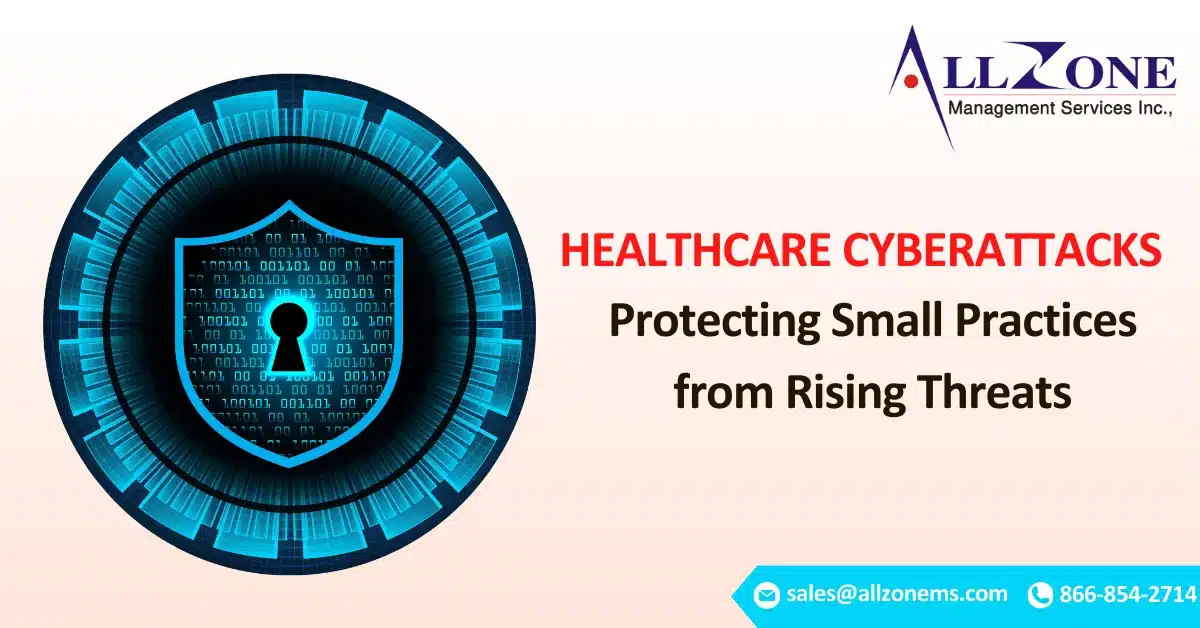Healthcare providers face a rising tide of Healthcare cyberattacks, which can have devastating consequences. These attacks are becoming more frequent and costly, and healthcare organizations are spending more than any other industry to recover from them.
Small Practices at Risk:
Small healthcare providers are particularly vulnerable to Healthcare cyberattacks due to limited resources and staff. They may struggle to implement effective security measures and often rely on their existing staff to handle both daily operations and cybersecurity tasks.
The Impact of Healthcare Cyberattacks:
Recent large-scale data breaches have forced the healthcare industry to adapt. Small practices were hit especially hard, as these attacks disrupted their operations and cash flow. Many had to hire additional staff to manually process claims and verify patient eligibility.
Proactive Cybersecurity Measures:
Despite the challenges, healthcare businesses can take proactive steps to strengthen their cybersecurity. There are cost-effective strategies that can help protect patient data without breaking the bank.
Here are key strategies to enhance your practice’s cybersecurity:
In today’s digital age, protecting sensitive patient data is paramount for healthcare practices. A robust cybersecurity strategy is essential to safeguard your practice from potential breaches and ensure patient privacy, and to prevent healthcare cyberattacks.
1. Encryption: A Foundation for Data Protection:
-
- Why it matters: Encryption transforms data into a code, making it inaccessible to unauthorized individuals.
- Where to use: Email, patient health information, personally identifiable information, and internal health-related reports.
2. Robust Firewall and Antimalware Protection:
-
- Firewall: Monitors and controls network traffic, blocking unauthorized access.
- Antimalware: Scans for and removes malicious software.
- Combined power: Together, they form a strong defense against threats.
3. Regular System Updates:
-
- Importance: Updates often include security patches to address vulnerabilities.
- Benefits: Improved system performance, reduced downtime, and enhanced user experience.
4. User Access Management:
-
- Principle: Grant access only on a need-to-know basis.
- Regular review: Ensure access privileges remain appropriate for each employee’s role.
- Prompt removal: Remove access for terminated or reassigned employees.
5. Multi-Factor Authentication (MFA):
-
- Enhanced security: Requires additional verification steps beyond a password.
- Common methods: Email, phone, or security token.
- Benefits: Significantly reduces the risk of unauthorized access.
6. Employee Security Training:
-
- Awareness is key: Educate employees about common threats and best practices.
- Regular training: Conduct annual training sessions and address new vulnerabilities as they arise.
- Empowerment: Equip employees to be vigilant and report suspicious activity.
7. Vendor Security Assessment:
-
- Third-party risks: Evaluate the security practices of vendors who handle your data.
- Due diligence: Ensure their security measures align with your practice’s standards.
- Contractual obligations: Include strong security clauses in vendor agreements.
8. Comprehensive Backup and Recovery Plan:
-
- Data protection: Regularly back up critical data to an off-site location or the cloud.
- Testing: Regularly test your backup and recovery procedures to ensure they work as intended.
- Disaster recovery: Develop a plan to quickly restore systems and data in case of a major incident.
9. Tabletop Exercises:
-
- Simulated scenarios: Conduct practice drills to test your response to cybersecurity incidents.
- Identify vulnerabilities: Assess your team’s preparedness and identify areas for improvement.
- Refine plans: Enhance your incident response plan based on the exercise findings.
By implementing these strategies, you can significantly strengthen your practice’s cybersecurity posture and protect your patients’ sensitive information, and help prevent healthcare cyberattacks.
Healthcare Cyberattacks on Revenue Cycle Management (RCM) Companies: A Growing Threat:
Allzone MS is a leading provider of healthcare revenue cycle management solutions. With a deep understanding of the industry’s unique challenges and regulatory requirements, Allzone MS is committed to delivering comprehensive and secure solutions to protect sensitive patient data and optimize revenue cycles.
Healthcare cyberattacks on RCM companies pose a significant threat due to the sensitive nature of the data they handle. This data includes patient medical records, financial information, and insurance details, making it a prime target for hackers.
If an RCM company falls victim to a cyberattack, the consequences can be severe. Patient privacy breaches can lead to identity theft, financial fraud, and emotional distress. Disruption of RCM operations can hinder healthcare providers’ ability to collect payments, impacting their financial stability and ability to deliver care.
Additionally, ransomware attacks targeting RCM companies can encrypt their data, demanding a ransom payment for its decryption. Refusing to pay can result in permanent data loss, further disrupting operations and potentially leading to patient care delays.
RCM companies must invest in robust cybersecurity measures to protect themselves and their clients from these devastating attacks. This includes implementing strong access controls, regularly updating software, conducting employee security training, and having a comprehensive incident response plan in place.
Allzone MS offers a range of cybersecurity solutions to help RCM companies mitigate these risks, including:
-
- Data encryption: Protecting sensitive data from unauthorized access.
- Firewall protection: Preventing unauthorized access to networks.
- Intrusion detection and prevention: Identifying and stopping cyberattacks.
- Regular security audits: Assessing vulnerabilities and identifying areas for improvement.
- Employee security training: Educating staff on best practices for data security.
By partnering with Allzone MS, RCM companies can gain peace of mind knowing that their sensitive data is protected and their operations are resilient to cyber threats.

